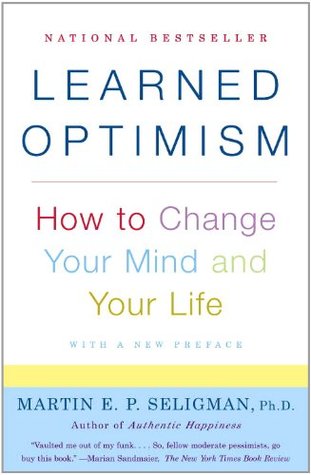More on this book
Community
Kindle Notes & Highlights
Read between
June 7 - June 7, 2018
Until recently there were only two accepted ways of thinking about depression: the psychoanalytic and the biomedical. The psychoanalytic view is based on a paper that Sigmund Freud wrote almost seventy-five years ago. Freud’s speculations were built on very little observation and a very free use of imagination.
As I listened to Overmier and then looked at the whimpering dogs, I realized that something much more significant had already occurred than any result the transfer experiment might produce: Accidentally, during the early part of the experiment, the dogs must have been taught to be helpless. That’s why they had given up.
Some people, the ones who give up easily, habitually say of their misfortunes: “It’s me, it’s going to last forever, it’s going to undermine everything I do.” Others, those who resist giving in to misfortune, say: “It was just circumstances, it’s going away quickly anyway, and, besides, there’s much more in life.”
When such losses occur, what happens next is regular and predictable: We feel sad and helpless. We become passive and lethargic. We absolutely believe that our prospects are bleak and that we lack the talent to make them brighter. We don’t do our work well, and we may be absent from it frequently. The zest goes out of activities we used to enjoy, and we lose our interest in food, company, sex. We can’t sleep.
She said she felt “empty.” She felt there was no hope for her because she was “unlovable” and “untalented,” and “a washout.” Her classes were boring, the whole academic system a “conspiracy to stifle” her creativity, and her feminist activity a “pointless fraud.”
I'm unexcited. Feel both dumb and incompetent. I question my basic abilities, worthiness to others, and if my life should continue.
In a study of couples in conflict, each person dictated into a tape recorder what he or she did every time there was marital trouble. In overwhelming proportions the women focused on and expressed their emotion, and the men distracted themselves or decided not to be concerned with their mood.
The belief in self-improvement is a prophecy just as self-fulfilling as the old belief that character could not be changed. People who believe they don’t have to be sedentary or hostile will try to take the steps that get them jogging or make them think twice when trespassed against; people who don’t believe change is possible will indeed remain incapable of change.
“If a drunk reeling on the street told you you were repulsive, would you discount it?” “Sure.” “But when you say equally groundless things to yourself, you believe them. This is because you think the source, yourself, is more credible. It isn’t. Often we distort reality more than drunks do.”
Trying to make the point, I asked him: “Did you ever have a friend that you used to like a lot and then stopped liking so much?” “Yes,” he agreed reluctantly, searching his memory. “Well, that’s the way your mother and I feel about each other. We don’t love each other anymore, and we never will again. We’ll never get married to each other again.” He looked up at me, nodding agreement, and then, having the last word, concluded the discussion: “You might!”
Bertrand Russell said that the mark of a civilized human being is the ability to read a column of numbers and then weep. Is the American public as “uncivilized” as the news producers think? Are we incapable of understanding statistical arguments or do we only understand anecdotes?
The fundamental guideline for not deploying optimism is to ask what the cost of failure is in the particular situation. If the cost of failure is high, optimism is the wrong strategy.


